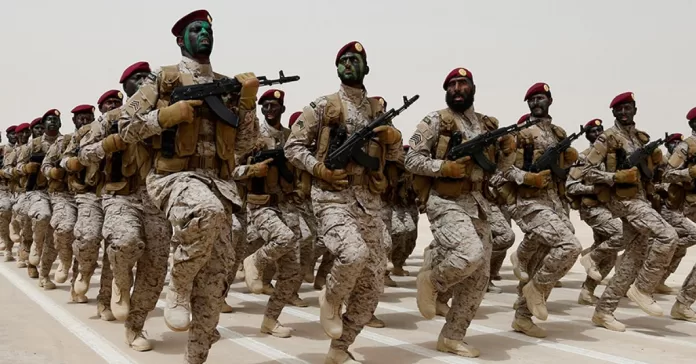Terrorism is not a new phenomenon. It has had been terrifying the state and people alike around the world in the past. Vested socio-economic, geo-political and geo-strategic conflicting interests have been the main reasons of this menace. It has been projected as struggle between the virtue and vice. It has been persisted battlefield between dragons of oppression and angels of humanity. It has been remained dead man walk between the spirits of violence, sabotage and peace & harmony around the world.
In the human history every country has different counter-terrorism strategies. Counter-terrorism incorporates the practices, tactics, techniques, and strategies that governments, militaries, police departments and corporations adopt to attack terrorist threats and/or acts, both real and imputed. It includes both the detection of potential acts and the response to related events.
Recent history reveals that most counter-terrorism strategy is ineffectual conflicts drag on for years or decades without solutions and countries incur enormous costs in lives, money and lost opportunity. Paradigm shift is needed to tackle the terrorism because it is not the right solution to fight fire with fire. It is also not the war of physical might rather is the war of ideas.
The challenge is to develop counter-terrorism strategies that deal effectively with the threat without antagonizing citizens or neighboring states. Most counter-terrorist strategies focus on a military or police perspective and overlook the prospects for diplomacy, negotiation and reform, especially in the early stages of conflict, when possibilities may exist to deflate the pressures at least risk and least cost.
In Northern Ireland, Israel-Palestine, Sri Lanka, and others, states have developed and tested extensive counter-terrorist campaigns over long periods of time. However, the fact that these campaigns have been relatively unsuccessful in ending protracted conflicts suggests that state counter-terrorist strategies may be flawed. Moreover, the states from Turkey, Nicaragua, El Salvador, Colombia and Peru that have few democratic institutions or modest human rights traditions have pursued full-blown military campaigns in efforts to crush opposition movements. Regardless of the government structure many states adopt similar strategies, while those without legal and judicial constraints are prone to pursue increasingly repressive, even illegal tactics.
Saudi counter‐terrorism policy can be divided into ‘hard’ and ‘soft’ measures. It is the right combination of the two approaches that is regarded as the success of the Saudi counterterrorism approach. But it is especially the soft approach that has been considered successful and has attracted much positive attention.
The Kingdom of Saudi Arabia is the success story to marginalize the al Qaeda attacks by using effective counter-terrorism strategies. It has multidimensional counter-terrorism strategy. It has been reflection of collective wisdom of the government, religious clergy, intelligence agencies, policy and the last but not the public to fight against all odds to eradicate the peril of terrorism. It has been using the modern techniques/tactics of crisis management, conflict resolution and human resource management. Effective tools of communication have also been extended to mislead people in order to bring them back to life from clutches of darkness and coercion. Human psychology has also been applied to tame the violent turned youth to bring them towards normality and productivity. Various rehabilitation policies/programs have also been pursued to make lives useful to the society. It has been gigantic effort on the part of the Saudi Arabia’s government.
Saudi started designing a counter terrorism strategy through posing the strategic questions: who, what, why, when and where and ultimately it succeeded to marginalize the terrorists in the country.
Integrated Counter-Terrorism Strategies (Soft)
Saudi Arabia has been pursuing a comprehensive counter-terrorism strategy (soft) for the last so many years. The main objectives of its counter-terrorism strategies are pinpointed in table 1.
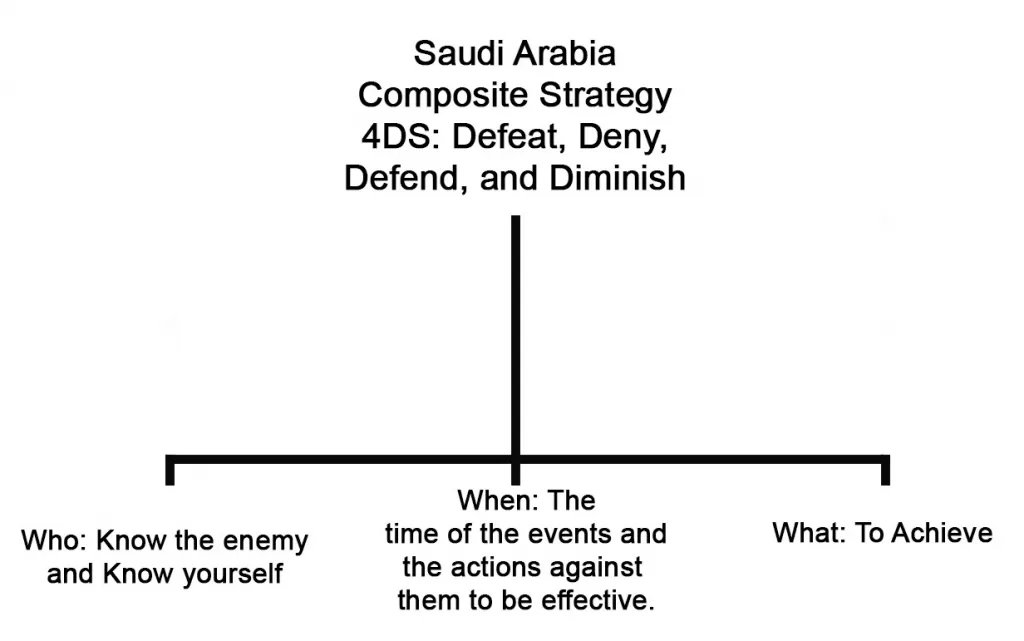
| Table 1 | |
| Objectives | Elaboration |
| Highlight the concepts and causes | Terrorism and, the historical, ideological and cultural developments fuelling terrorism in human communities. |
| Correlation | Relationships between terrorism and money laundering on one hand, and between it and narcotics and arms trafficking on the other. |
| Identification | Structural aspects, composition and working patterns of terrorist organizations. |
| Practically | Practical conclusions and suggestions to support international efforts in fighting terrorism. |
Tragic incident of 9/11 brought not so friendly and good experience for the Saudi Arabia’s government and its people alike. It was the start of blame game afterwards; the West was in search scape goat. The Kingdom of Saudi Arabia initiated multidimensional counter-terrorism strategies. Moreover, in the aftermath of a wave of deadly terrorist attacks that began in 2003, the Kingdom of Saudi Arabia launched a wide-ranging counterterrorism campaign. Soft measures have been the epicenter of its counter-terrorism strategies. It was designed to combat the intellectual and ideological justifications for violent extremism. It was dealt with an ideology which was based on corrupted and deviant interpretations of Islam. The impetus for this soft approach came in large part from the recognition that violent extremism cannot be combated through tradition security measures alone. This Saudi strategy is composed of three interconnected components, i.e. the rehabilitation, counter-radicalization and wars of ideas.
Rehabilitation and counter-radicalization programs have been used by various countries around the globe.
Algeria, Egypt, Jordan, Yemen, Singapore, Indonesia, and Malaysia are among nations that have begun similar programs to demobilize violent militant groups, offshoots and their sympathizers in the public. Rehabilitation is also being adopted by some Western governments, including the U.S. military through Task Force 134 operating in Iraq. The Saudi government has been used these programs either directly or indirectly with the best funded and longest continuously operating rehabilitation program.
The government of Saudi Arabia views the struggle against violent extremism as part of a “war of ideas” centered upon issues of legitimacy, authority, and what is permitted in Islam. The Saudi policy for tackling terrorism, extremism and radicalization is outlined in a plan termed the Prevention, Rehabilitation, and Aftercare (PRAC) strategy.
The PRAC strategy establishes goals and challenges for Saudi government, and it pinpoints ways to combat the spread and appeal of extremist ideologies.
The state organized amnesties in 2004 and mid‐2006 and offered mediation to allow terrorists to hand themselves in. Many international experts have been duly impressed by the successes of this approach along with even the US praised its counter‐terrorism discourse.
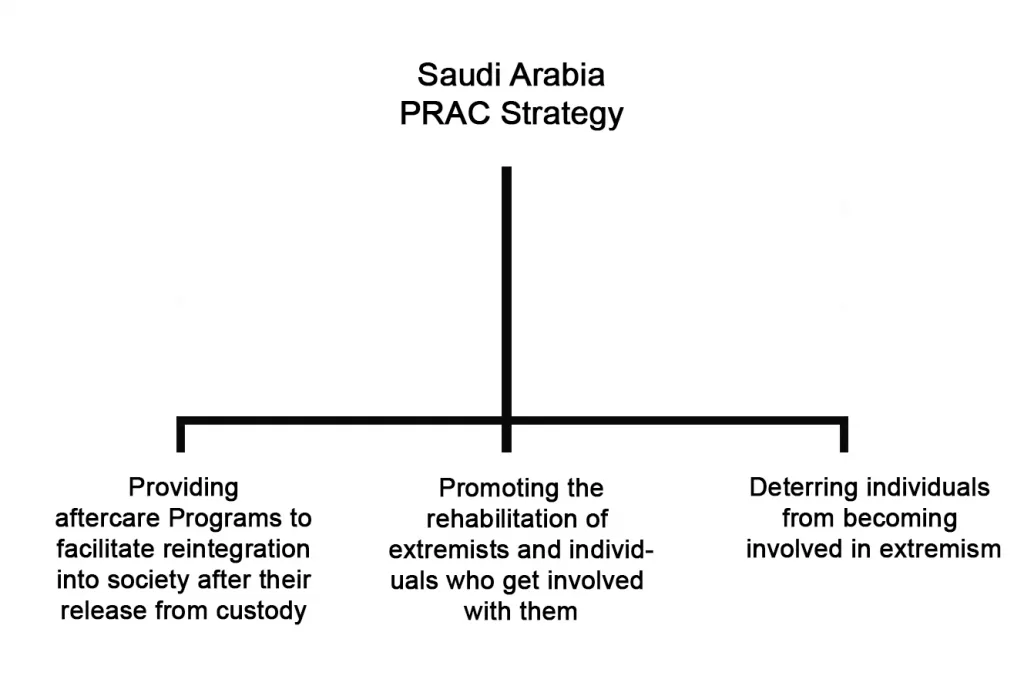
| Its salient features and counter-terrorism strategies (soft) are given below as: | |
| Actors/Factors | Counter-Terrorism Strategies |
| Portraying of extremists/terrorists | Illegitimate for having perverted true Islam |
| Farming of authority and understanding of religious doctrine | Extremists lack both. The state helped misguided believers return to the correct understandings of Islam. |
| Use of violence within the Kingdom | Not permissible. Only legitimate scholars and knowledgeable authorities, the government argues, can engage in such activities as authorizing a permissible jihad. |
| War of Ideas | Violent radical Islamist extremism cannot be defeated by traditional security means alone. Implementation of the soft counterterrorism policies defeated the ideological infrastructure that supported and nurtured political violence. The Saudi campaign strived to prevent exposure to takfiri beliefs; to refute those ideas and encouraged the rehabilitation of offenders; and to promote policies that prevent relapses. It has been combination of cooptation, patronage, and coercion. |
| Active Role of Police | The al Qaeda attacks turned public opinion against the terrorists and the police proved capable of using this shift to obtain tips and chase down the active terrorists. The policy developed elaborate informant network as well as Internet monitoring systems. |
| Supervision of clergy | The government closely supervised the vast religious clergy. It maintained close personal relationship with these clerics. |
Propagation of concept of da’wah (call to faith)
Initially the government of Saudi Arabia strived to cast extremists as illegitimate and terrorism has nothing do with Islam. The government framed terrorism as an evil ideology. The state aspired to help misguided believers return to the correct understandings of Islam. It worked with the Saudi concept of da’wah (call to faith) as a governmental obligation. Its media campaigns highlighted that use of violence within the kingdom to affect change is not permissible. Only legitimate scholars and knowledgeable authorities and the government can engage in such activities as authorizing a permissible jihad.
Initiate Mutual Dialogue
The government of Saudi Arabia initiated series of dialogue with the mislead people at different levels and in different shapes. By implementing the prison counseling and extremist dialogue program with the integrated efforts of ministries of Islamic Affairs, Endowment, Da’wah, and Guidance; Education; Higher Education; Culture and Information; Labor; and Social Affairs it succeeded to win the psychological warfare against the terrorists. Its primary object was to encourage the various ministries and government agencies to get involved in the effort to educate the public and combat the ideology that fostered extremism.
Its highly projected counseling program drew on several Saudi traditions, including notions of cooptation and persuasion, a history of rehabilitation and reintegration programs for criminal offenders, and the use of religious figures in the prison system. The counseling program has its origins in a focused public engagement campaign launched several years ago by the Ministry of Interior to address prisoner welfare issues in Saudi prisons. The Ministry of Education arranged lectures and programs throughout the kingdom’s schools to educate and warn students from a very early age about the dangers of extremism and the effects of terrorism and violence.
Public Information and Communication Campaigns
A diversified but integrated large-scale public information and awareness campaign was started. The goals of these efforts were to deepen cooperation between the state and the public; highlight the damage done by terrorism and extremism; and end public support and tolerance for extremist beliefs. New verbal and non-verbal communication strategies and means were devised to win the hearts and souls of the people.
It put up signs and billboards throughout Riyadh focusing on the evils of terrorism. Billboards along major roads and signs hung from overpasses all drew attention to carnage of the attacks. Some juxtaposed images of the faithful praying at Kaaba in Mecca with photos taken at the scene of some of the attacks. Typical slogans included “Our religion rejects terrorism” and “We all say no to terrorism.” Others portrayed the debris of car bombs and asked: “Are these the actions of the sons of our nation?”
Other signs important nonverbal communication strategies fostered greater cooperation between the police and public security officers and the general public. One image featured two clasped hands, one belonging to a person in a traditional thobe and the other in uniform. The image and others were designed to urge the public to cooperate with security personnel and demonstrate that the government and the people were acting together to preserve public safety.
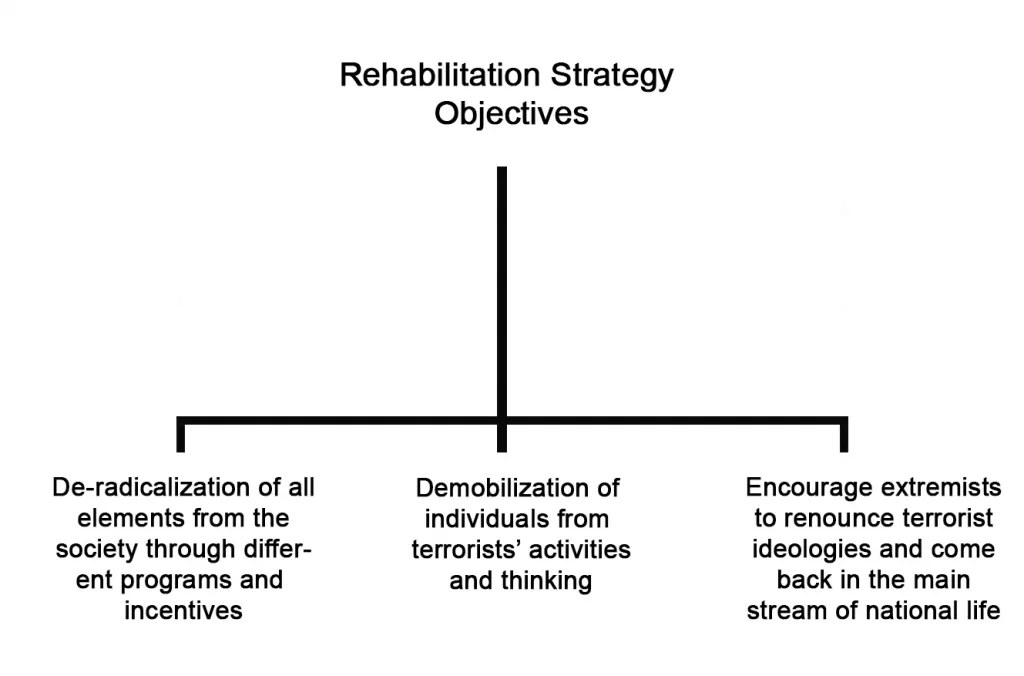
Rehabilitation Strategy
The prerequisite of Saudi Arabia’s rehabilitation strategy was the counseling program, a diversified but integrated effort to rehabilitate and reeducate violent extremists and extremist sympathizers through intensive religious debates and psychological counseling.
The doctrine of takfir played a great role and changed the perceptions of so many people about the conflicting realities as projected and propagated by the terrorist organizations. Detained security offenders were invited to participate in the rehabilitation process. Once the process was completed, those determined to have renounced their former beliefs were eligible to be released from custody.
Banking and Financial Reforms
Money laundering and dubious financial transactions have been remained easy operational filed for the regional terrorist network and international franchises around the globe. The government of Saudi Arabia introduced series of banking and financial anti-money laundering reforms in the country. New effective financial regulatory system was devised and institutionalized. The Saudi Arabian Monetary Agency (SAMA) had issued instructions to all Saudi financial institutions to implement the 40 recommendations of the Financial Action Task Force (FATF) of the G-8 countries regarding money laundering and the recommendations regarding terror financing. To strengthen the anti-money laundering mechanism the Saudi Arabian Financial Crimes Unit was also established in 2003 which further consolidated in shape of Financial Intelligence Unit (FIU) in 2005.
Public & Religious Education
On the recommendations of the think-tank and academia the government of Saudi Arabia steered an ongoing program to modernize textbooks and curricula, to introduce enhanced teaching methods and provide better training for educators. These changes were also extended to Saudi religious schools. Imams have been prohibited from incitement and talk of intolerance, and the Ministry of Islamic Affairs was conducting a program to educate imams and monitor mosques and religious education to purge extremism and intolerance.
Global Interfaith Dialogue Initiative
King Abdullah bin Abdulaziz launched the interfaith dialogue in order to mitigate the spillover repercussions of Samuel P. Huntington “clash of civilizations” and to promote the commonalities among the world’s religions. It highlighted the importance of dialogue and emphasized the need for the faiths and cultures of the world to combat extremism and intolerance. Series of international conferences have already been arranged throughout the world with the help of Kingdom of Saudi Arabia.
Time and again, the government of Saudi Arabia reiterated its political commitments to fight against terrorism. Most recently, in a conference held in Riyadh. In his speech, read out by Prince Muhammad Bin Naif Bin Abdul Aziz, Interior Minister, King Abdullah called for identifying the main security issues and sought “cooperation between the people and security forces to face the many dangerous challenges facing the Arab World and threatening its security.” The King also emphasized to correctly identify the challenges for Arab security before chalking out a comprehensive security vision characterized by political wisdom.
All the participants from the Arab World once again denounced all forms of terrorism and terror funding. The ministers urged all countries to abide by the decisions taken by the UN Security Council in this regard. The meeting commended the efforts of Arab security mechanism in combating terror and dismantling its networks by taking advantage of the successful experiments carried out by several countries. The statement specially noted the Saudi efforts in combating extremist ideology, especially through the efforts of the Prince Muhammad Bin Naif Center for Counseling and Care. The ministers welcomed the opening of King Abdullah Center for Interfaith Dialogue in Vienna, and Iraq’s call for holding a special conference on terror.
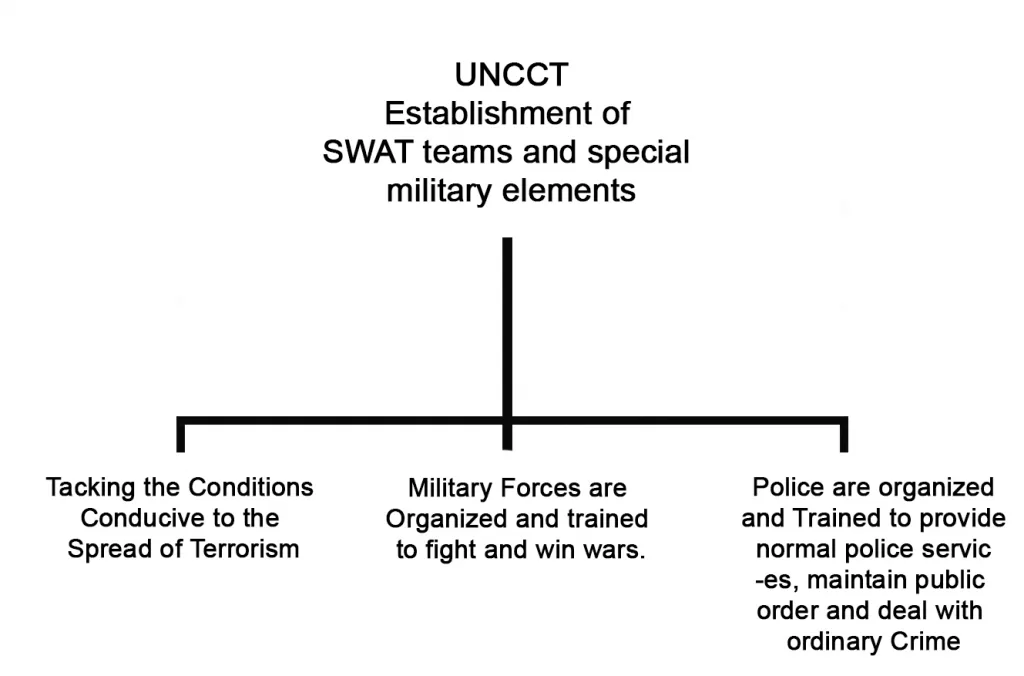
Visionary Role of Saudi Arabia
The King of Saudi Arabia played a tremendous role in formulating a comprehensive strategy to combat terrorism at regional and international levels. “The fight against terrorism is a common international responsibility requiring the highest degree of coordination and cooperation among members of the international community,” he said.
In his keynote speech at a meeting of the UN Counterterrorism Center’s advisory board in Jeddah delivered by Foreign Minister Prince Saud Al-Faisal, King Abdullah reiterated Saudi Arabia’s condemnation of all forms of terrorism.
He said Saudi Arabia has been contributing effectively under the umbrella of the United Nations to define terrorism, address its causes and eradicate its roots. “This stance reflects the Kingdom’s consistent and continuous policy against international terrorism and its perpetrators,” he added. King Abdullah described terrorism as a major threat to international peace and security.
Saudi Arabia leading role in UN Counter Terrorism Initiative
Saudi Arabia donated $ 10 million for the establishment of the UNCTC. Saudi Arabia played a leading role in the formation and functioning of the UNCTC. It was the fruit of the Riyadh anti-terror conference, where King Abdullah made a proposal to establish the center to coordinate international efforts to combat terrorism.
The primary mission of the Saudi government was to develop strategic partnerships with multilateral organizations and foreign governments to excel in counterterrorism objectives and protect the national security of the country. Working with international partners, Saudi Arabia has taken a leading role in developing coordinated strategies to defeat terrorists at home and abroad, to thwart extremist advancements and to engage and rehabilitate at-risk populations.
It was formed in September 2010 with the purpose of executing the UN Global Counter-Terrorism Strategy, adopted by the General Assembly in 2006. We are living in complex and complicated web where terrorism has become a permanent security and survival issue, involving high costs, communal fear and uncertainty, every potential solution must be examined and debated. Northern Ireland offered a classic study of counter-terrorism strategies where the United Kingdom (UK) initially dealt with the Irish Republican Army (IRA) as a military engagement i.e. one army versus another. With the passage of time it realized to bring changes in it and adopted a different strategy of criminalization that denied IRA activists certain rights under international law ordinarily available to enemy combatants. It is even true in case of the United States of America (USA) ongoing war against terrorism as it preferably tries to determine the status of prisoners and the proper courts for trial, if any.
Evolving Counter-Terrorism Strategies
Although terrorism is as old as history, in recent years, it has acquired new dimensions in its ability to threaten both governments and their people by taking advantage of the stresses of modern day life, like technology, particularly information, communication, and weapons technology. These technological advancements enable a small handful of people to threaten and intimidate the lives of millions of people. The government of Saudi Arabia also adopted new techniques and ways of means to successful counter the emerging trends in the orbit of terrorism.
| Different Emerging Trends | Aims | Counter-Terrorism Strategies |
| Violent Political Groups (VPGs) | Need money, activists, public support, freedom to maneuver, access to weapons and explosives, secrecy, and publicity | States can institute programs to deny and disrupt each of these VPG lifelines. The organization, skills and training required may be beyond the scope of traditional police or military organizations |
| Covert Orientation | Difficult to identify and remain lethal | Electronic measures such as wiretaps and visual surveillance (SIGINT), as well as programs to infiltrate terrorist organizations, or recruit informers (HUMINT) |
| Concept of Franchise | Provide financial and logistical resources to kindred franchisees | Coordinated efforts and information sharing protocols at regional and international levels |
| More Deadly Demonstration | Terrifying the public at large, earn money for living and continuation of these fatal activities (kidnappings and plane hijackings) | Modern gadgetry and effective HRM |
Suggestions
Unified global strategy and effort: It constitutes a paramount threat to the peace, security and stability of all countries and peoples. There should be unified global strategy; and an organized international effort to combat terrorism and extremism.
Unanimous definition of terrorism: All philosophical, political, structural and socio-economic barriers must be eliminated to reach a unanimous definition of terrorism.
Serious taught to all possible factors or counter-productive elements: Holistic approach is needed to reach at the gross-root levels of terrorism.
Conflict resolution: Conflicting socio-economic, geo-political and geo-strategic issues must be resolved in order to dismantle the nurseries of terrorism around the globe.
Discard the concept of clash of civilization: It has been very harmful to regional and global peace and harmony. Religion has nothing to do with the any kind of terrorism.
Widespread of political participation: Greater political rights, respect for human rights and civil liberties would be anti-terrorism.
Un-prejudiced educational system: All means of discrimination and education divide must be settled.
Spirits of tolerance and co-existence: Culturally different but still humans should be the mantra of every country.
Systematic approach towards migrants: It would be serious threat to even a host country after some time e.g. Pakistan. Comprehensive strategy in this regard is the hot topic.
Effective role of UN: It should not be only debating forum. There should be close liaison between the UN Security Council Counter Terrorism Committee (CTC) and the Terrorism Prevention Branch of the UNODC.
Act on UN Security Council resolutions 1267, 1373, 1526, 1540 and 1566: It constitute a solid and comprehensive basis for combating terrorism on a universal scale. All countries should take necessary measures in order to fully comply with the provisions of the above mentioned Security Council resolutions.
No access to terrorists to weapon of mass destruction: All efforts ought to be carried aiming at preventing terrorists’ access to weapon of mass destruction and their means of delivery.
Banking and Financial system: Strengthening international, regional and bilateral cooperation among states to identify, disrupt, and dismantle the financial underpinning of terrorism, as well as the activities of organized crime groups, illegal weapons, and explosives trafficking and illicit narcotics trade.
Establishment of effective Financial Intelligence Units (FIUs): It meet the criterion of Egmont Group Definition and standards, and to have these FIUs join the Egmont Group to share their experience, expertise, and operational information.
Constant flow of information: Information sharing is anti-terrorism assets and an effective tool which needs to be implemented in letters and spirits.
Better laws against arms and explosives trafficking: Human, drugs smuggling, money laundering must be stopped.
Capacity building measures: Regional and international levels, capacity building measures must be initiated at once.


